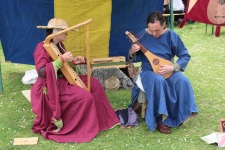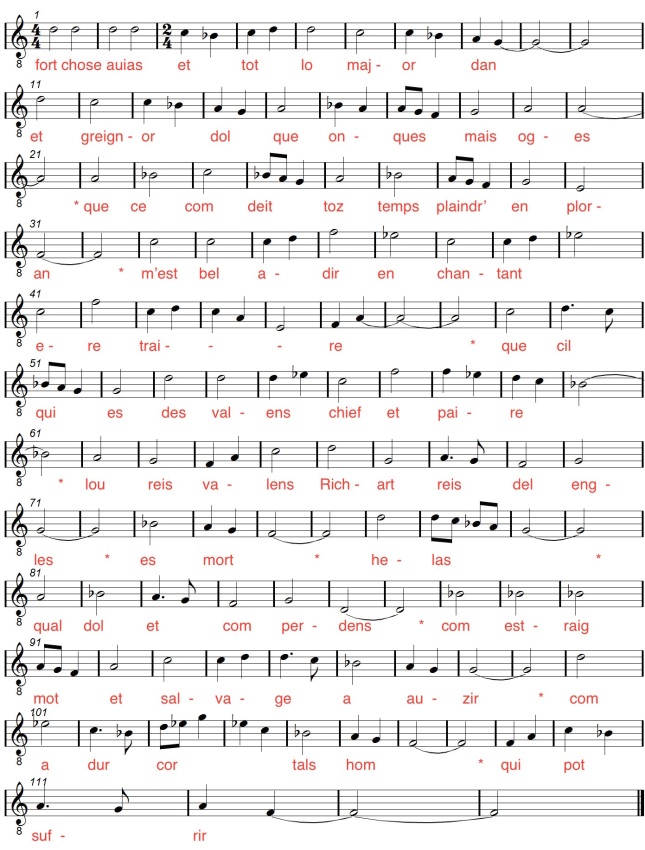We have been really getting to grips with some new repertoire over the last few weeks, and it’s all shaping up to a very pleasing and varied programme of music for our ‘Magna Melodia’ concert of music from the time of the Magna Carta. One tune that we’ve been working on in particular is the lament on the death of Richard the Lionheart, by the troubadour Gaucelm Faidit.
This lament is usually known as ‘Fortz chausa es’, which is its original Occitan title, but the song with its music survives in four manuscripts (and many more with just the words), and we have chosen to do one of the lesser-known versions, in which the song has been reworded in French (or more like heavily Frenchified Occitan). We went for this version for a couple of reasons – firstly, it is the one in our beloved ‘Chansonnier du Roi’, the mid-thirteenth century collection that is the basis for our 2012 CD Music for a Medieval Prince. It’s always nice to expand our repertoire from this wonderful source. Secondly, this much less well-known version of the tune is a bit different (though clearly ‘the same’ in a broad sense) and this allowed scope for us to develop our own version of the song. Thirdly, we liked the idea of a French version, as we thought it more likely for an aristocratic English audience, whose own language would have been (broadly) that of northern France. Use of the Chansonnier version, however, brought its own problems. Firstly, there are only two verses given (other versions are much longer), so we will only work with these two. Secondly, there are the usual problems of damage in the Chansonnier, and very small sections of both music and words are missing. We have substituted these sections from other extant versions.
It is a stunning song in which words and music work so well together to express the devastation felt at the death of King Richard. The verse is through composed – there is no repetition of themes or phrases, rather the tune is continually changing and developing, while retaining an overall unity. Here is our working version of the first verse, (although eventually it will probably end up a bit freer in rhythm); asterisks mark the ends of lines:
Here’s my rough translation, to give an idea of the flavour of the piece:
It’s a harsh matter and certainly the most harmful, and the most grievous sorrow that ever was. This thing that should be mourned for all time with weeping, I must say it well in singing and must recount it. He who was of valiant men the captain and the father, the valiant king Richard, king of the English, he is dead – alas – what sorrow and what loss – what an unfriendly word and savage to hear. The man that can endure it has a hard heart indeed.
In the second verse, the poet goes on to compare Richard – favourably, of course – with Alexander the Great, Charlemagne and Arthur. In other versions, further verses lament the fate of the Holy Land now that Richard is no longer around to fight for it.
I have been learning the song, and I found it a little hard at first to get a handle on it, but the more you sing it the more interesting and satisfying it gets. The melody is really unusual and in this version ends off the tonic – curious but beguiling! I am looking forward to singing it in concert, when it will be accompanied by the medieval lute.
While ‘Chose fort avias’ has been our major focus over the last week, we have also begun work on a wonderful piece of Aquitanian polyphony, the ‘Lux refulget’. This has some incredibly mobile melodic lines for us to master! Paul has begun work on Bernart de Ventadorn’s “La dousa votz’, and I have been working hard on ‘Man mei longe him lives wene’ and ‘Foweles in the Frith’: the latter sounds very sweet with both lines played on the harp. We will post up some sounds on Facebook soon!


Of all early music, I find the troubador songs the hardest to get a feel for, perhaps because the idea of a sung story has been somewhat lost to western culture in the intervening years?
I look forward to hearing your interpretation.
I just love the melodies of the troubadour songs, and the way that they work with the words. Both aspects are equally important, although we enjoy doing intrumental versions of several songs. This one’s a really good example of words and music working together – hope we can do it justice! Thanks for your interest and stay in touch…